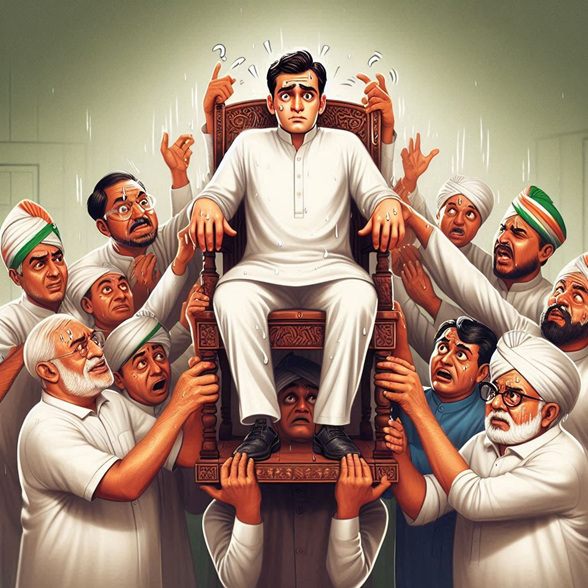After securing an absolute majority in two successive elections, even crossing the 300 mark in 2019, the BJP was anticipating a crushing defeat of its opposition this time too. But by the end of 4th June, It was clear that BJP alone would not secure the absolute majority and had to rely on the pre-poll partners to stake a claim at the government. Following three months of intense canvassing and campaigning to secure the ‘janadesh’ (people’s mandate) in their favor, the 2024 general elections concluded with the BJP-led NDA obtaining the necessary mandate to the government. INDIA alliance’s dogged persistence ensured a remarkable 234 seats to its name, thereby rendering BJP well short of the halfway mark in a 543-member Lok Sabha.
This verdict has landed the Modi-Shah duo in uncharted territory, wherein they not only have to accommodate non-BJP and ideologically non-aligning parties but also have to rely on them for any legislative moves. Although BJP is the major constituent of the NDA, now, with truncated seats, it will be difficult to formulate and execute laws with disdain, which, with given numbers in Parliament, previously would do.
Collective in Democracy
Democracy is about the collective and never about individuals; therefore, when an individual becomes bigger, then the reduction of the size of an individual in any democracy is always a positive sign for a vibrant democracy. The most significant factor of the 2024 general election was the BJP’s overconfident sail on “Modi Magic”, where BJP time and again reiterated ‘400 Paar’. However, the Indian public showed that the “Modi Magic” appeared to have waned significantly and brought the BJP to 240. The opposition’s election goal was to save the constitution and thereby democracy itself from the arbitrary use of individual power and their vendetta politics. Fortunately, they succeeded in all of it. Democracies should never be about an individual or a party, but collective, and the election results reiterated it loudly.
Coalition Discomforts

INDIA Alliance was a coalition of contradictions, a contradiction to the way by which PM Modi ran the Parliament. There is no doubt that PM Modi is a majoritarian Prime Minister who today has no majority by his own party. The two major alliances supporting NDA – Chandrababu Naidu and Nitish Kumar- do not share the Prime Minister’s communal and majoritarian vision, nor do they have a history of undermining institutions. The leaders of the two major alliance partners of the NDA also do not believe in vendetta politics. The repetition of ‘NDA’ in the recent statements of senior BJP leadership (which had disappeared from their lexicon) shows the changing behaviour of the overconfident BJP leaders towards their fellow mates.
Now, it is no longer “Modi Sarkar” but “NDA Sarkar”. The 234 seats of the INDIA alliance shifted the paradigm and again revived the collective politics in Indian Political Culture. The INDIA alliance succeeded in their goals/motive, the NDA alliance will have to think before surfacing any bill to the Parliament and can’t formulate laws and policies without discussing in the Parliament with its allies and opposition, which so far Modi-Shah duo have been incapable of managing in coalition politics.
It will be interesting to observe whether the INDIA alliance remains steadfast in pursuing their shared objectives against communal and majoritarian forces. Despite the convergence in common goals, the next five years are going to be challenging for the INDIA alliance to keep its ideologically divergent partners close, as well for the NDA government against a strong and united opposition.
Hope for democracy
For a decade BJP had absolute numbers in Parliament, which had given it unfettered control over legislature and institutions. Now, this inconvenient coalition would shackle it from political recklessness. Here, the INDIA alliance faring well in elections can be seen as a victory over the perceived moral turpitude of the BJP. This reflects a collective response from various political entities and sections of the electorate against what they view as the erosion of democratic values, social harmony, and institutional integrity under BJP’s rule. Coalition victories underscore a commitment to upholding secularism, pluralism, and constitutional principles, serving as a counterbalance to the BJP’s centralizing tendencies and ideological rigidity. Such outcomes reinforce the resilience of India’s democratic framework, illustrating the capacity of diverse political forces to unite in defence of the nation’s foundational ethos and to strive for a more inclusive and equitable governance model.
The moral victory secured by the INDIA alliance is a testament to the enduring strength of India’s democratic values and pluralistic ethos. It signifies a collective yearning for a more balanced and inclusive governance model that respects regional diversity, promotes economic and social justice, and safeguards the integrity of democratic institutions. While the numerical dominance of the BJP remains, the moral victory of the INDIA alliance provides a crucial counterbalance, ensuring that the voices of dissent and diversity continue to shape India’s democratic journey. This outcome not only reinvigorates the opposition but also reaffirms the electorate’s commitment to the core principles of Indian democracy, setting the stage for a more dynamic and contested political landscape in the years to come.
Authors
-

Anmol Kumar currently works as an Assistant Editor at Defence and Security Alert (DSA) Magazine. He holds a Bachelors in Persian language from Jawaharlal Nehru University and Masters in International Relations from Pondicherry University. He is well known for his research and analyses on topics like defence strategy, geopolitics, West Asia and anything that falls under the purview of international relations.
View all posts -

Vijay Kumar Maidergi is a PhD Scholar in the Department of Politics & International Studies, Pondicherry University.
View all posts





good
comment auto approval testing by developer
good